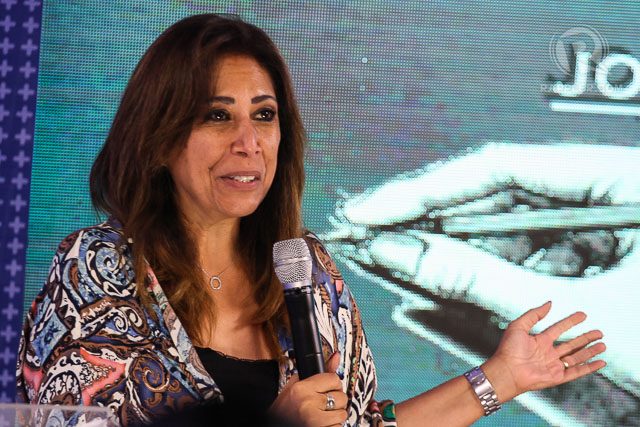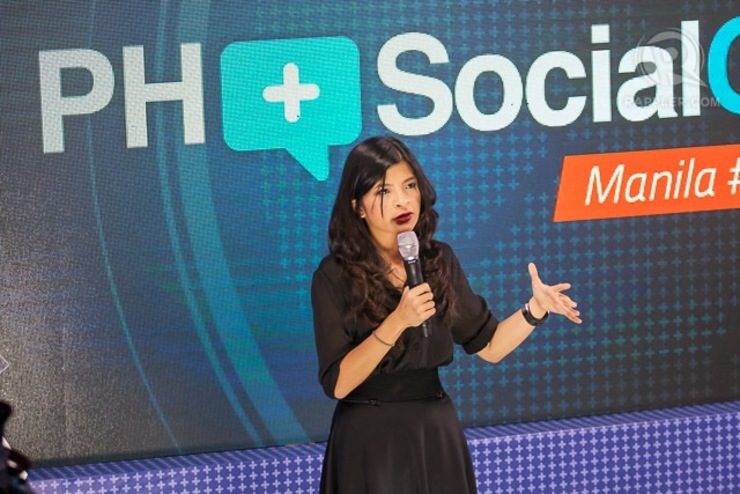SUMMARY
This is AI generated summarization, which may have errors. For context, always refer to the full article.

MANILA, Philippines (UPDATED) – In the face of an uprising or a disaster, how does a journalist remain objective?
Egyptian journalist Shahira Amin said it best: “Like activists, journalists want to right the wrongs in society. But we need to think about how we do that to avoid ethical traps.”
At the height of the Egyptian uprising against Hosni Mubarak in 2011, Amin left behind her lucrative job as deputy head and senior anchor of state-run Nile TV to join the street protests against Egypt’s longest running leader.
“Journalists become famous for the stories they write. I became famous for leaving my job,” Amin said during her talk at the 2014 PH+SocialGood Manila Journalism Summit in Manila.
Under Nile TV, Amin had been required to report about pro-Mubarak news fed by state propagandists. Tired of it, Amin said she decided she “could no longer be part of the propaganda machine.”
From then, Amin said she walked the fine line between being a participant and an observer as she covered violent protests in Egypt.
“Objectivity is very hard to maintain when violence escalates. I felt morally compelled to join the protesters rather than document what was happening,” she said.
It was a defining moment in Amin’s career. “My act of walking out sent a message that I had chosen to side with the people,” Amin said. “Because the issue was so close to me, it was difficult to maintain the slightest level of objectivity.”
“When people ask me, am I a journalist or an activist, I answer: an activist journalist because good journalism starts where good activism leaves off.”
– Shahira Amin, journalist
She said that to this day she continues to struggle with the need to walk the fine line between being an activist and a journalist.
“Since the revolution, I’ve covered protests, which are a daily occurence in the country. I’ve watched men and women being beaten up. Part of me wanted to intervene. But I knew my interference would only distort the reality of that situation so I told myself that if I became an agent rather than as an observer, there is no point in me being there as a journalist,” Amin said.
“Fundamentally, the role of a journalist in these situations is to observe and recount reality as faithfully as possible. Not to try to shape reality by interfering. So, this is what I’ve done over the last 3 years, unlike in Tahrir (Square) where I was with the protesters,” she added.
But can a journalist be truly objective? “No, because we have to remember our human biases,” she said.
Watch Shahira’s talk at the PH+SocialGood: Tacloban Journalism Forum below.
Covering disasters
Rappler multimedia manager Patricia Evangelista said that it’s tough to be objective in the face of suffering.
Evangelista covered the aftermath of Super Typhoon Yolanda in November 2013, as well as other disasters and conflicts in the country. (WATCH: The men of Village 88)

Asked how she detaches herself from her stories of death and devastation, Evangelista answered: “You can’t.”
“We choose the stories that move us. If we’re not moved, we can’t move other people,” she said.
As Evangelista churns out award-winning stories showing the human face of disaster, she is also aware of her role as a documentarist – thinking about frame rates, how the shot would look like, and how the narrative would flow.
“The irony of covering disasters is that you have to be cold but you have to be human,” Evangelista said.
Watch her talk below.
Advocacy journalism
Amin has found a platform that allows her to be a journalist and an advocate at the same time.
After quitting what she said was her “dream job” as an anchor, Amin now writes for indexoncensorship.org, among other endeavors.
Amin describes advocacy journalism as “fact-based but presents a specific point of view.” It’s also about pushing boundaries.
When Amin reported about why female genital mutilation in Egypt should be stopped, she was criticized and threatened by state security forces for putting Egypt in a bad light.
But the practice gained so much attention in Egypt and around the world that the Egyptian government was forced to pass a legislation banning it.
It is these gains that prove there’s a common ground for journalism and activism when done right, she said.
“When people ask me, am I a journalist or an activist, I answer: an activist journalist because good journalism starts where good activism leaves off.” – Rappler.com
Add a comment
How does this make you feel?
There are no comments yet. Add your comment to start the conversation.